Business in Central Africa (Bachelor of Science)
Central African Economic Integration. Doing Business in the Central African Countries I (Bachelor of Science in Inter-African Business, e-learning, fourth semester)
| Bachelor of Science in Inter-African Business |
Subject - “Central African Economic Integration. Doing Business in the Central African Countries I” (8 ECTS) - Online Bachelor of Science in Inter-African Business (fourth semester).
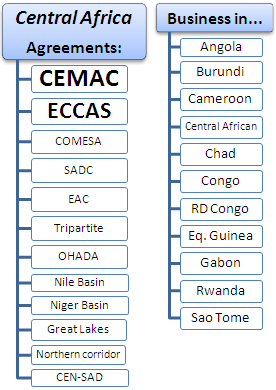
Objective
The main objective of the subject “Business in Central Africa” is to offer a global vision of the economy and the business opportunities in the Central African Markets.
- To learn to do business in Cameroon, Gabon, Angola, Congo, the Central African Republic, Burundi.
- To understand the importance of the CEMAC (Central African Economic and Monetary Community), CEN-SAD (Community of Sahel-Saharan States) and ECCAS (Economic Community of Central African States)
- To analyze the business and investment opportunities in Central Africa
- To analyze the International Trade of Central Africa
- To know the Trade Agreements in the region
- To know the main Businessmen of Central Africa
- To know the main ports and Trans-African Corridors of Central Africa
- To develop a Business Plan for Central Africa
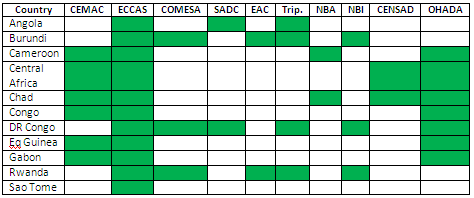

Syllabus of the Program: Central African Economic and Monetary Community (CEMAC).
- Introduction to the Central African Economic and Monetary Community (CEMAC)
- Organization chart of the CEMAC
- Regional Economic Program
- Specialized institutions of the Central African Economic and Monetary Community
- Central African Economic Union and Monetary Union
- Development Bank of Central African States (BDEAC)
- Economic Commission for cattle raising
- International Commission of the Basin Congo-Oubangui-Sangha
- Economic outlook by countries: Cameroon, the Republic of the Congo, Gabon, Equatorial Guinea, the Central African Republic and Chad
- Customs of the Central African Economic and Monetary Community
- Customs Tariff of the member countries of the Central African Economic and Monetary Community
- Customs procedures
- Sydonia System
Objectives of the Program “Central African Economic and Monetary Community (CEMAC)”:
- To understand the objectives of the Central African Economic and Monetary Community
- To evaluate the advantages for the member countries and the areas of cooperation of the CEMAC
- To analyze the Economic Integration process and International Trade between the member countries of the CEMAC
- To understand the Economic and Monetary Union of the CEMAC as well as the customs procedures and the Sydonia System
- To know the Regional Economic Program of the Central African Economic and Monetary Community (creation of an Integrated Economic Area in 2025)
- To analyze the role of the institutions related to the CEMAC: BEAC, BDEAC
Bank of Central African States (BEAC).
- Introduction to the Bank of Central African States
- Monetary Policy of the Bank of Central African States
- Reform of the CEMAC Payment systems
- System of tele-compensation of Central Africa
Syllabus of the Program: Economic Community of Central African States (ECCAS).
- Introduction to the Economic Community of Central African States (ECCAS)
- History and context of the ECCAS
- Structure of the Economic Community of Central African States
- Areas of intervention of the Economic Community of Central African States
- Specialized agencies;
- Regional Commission for Fisheries of the Gulf of Guinea
- Commission of the Central African Forests
- Power Pool of Central Africa
- Anti-poaching and illegal ivory trade the Economic Community of Central African States
- Green economic development in Central Africa
Objectives of the Program “Economic Community of Central African States (ECCAS)”:
- To understand the objectives, functions and specialized agencies of the Economic Community of Central African States
- To evaluate the advantages for the member countries of the ECCAS and the areas of cooperation
- To know the socio-economic context and development challenges of the countries of the Central African region
- To analyze the Economic Integration process and International Trade between the member countries of the Economic Community of Central African States
- To analyze the impact of illegal trade on ivory and the green economic development in Central Africa
Syllabus of the Program: Economic Community of the Great Lakes Region (CEPGL).
- Introduction to the Economic Community of the Great Lakes Region (CEPGL)
- Agencies of the Economic Community
- International Society of electricity of the countries of the Great Lakes: Burundi, the DR Congo, Rwanda
- Regional Economic Program 2014-2020
- Economic Integration, Investments, International Trade, and Promotion
- Private Sector Forum of the Economic Community CEPGL
- Northern Corridor
Syllabus of the Program: Angolan Economy and Foreign Trade
- Introduction to Angola
- Angolan Economy
- Isabel dos Santos (the richest African Women)
- Angolan private sector
- Angolan International Trade
- Port of Luanda and Port of Lobito
- Business opportunities in Angola
- Mineral resources, diamonds and petroleum
- Agriculture
- Industries
- Transport and Logistics in Angola
- Real State
- National Agency for Private Investments - ANIP
- Invest in Angola
- Case Study:
- Telecom Angola
- Sonangol
- Angolan National Diamond Company
- Introduction to the Portuguese
- Access to the Angolan market
- Business Plan for Angola
Objectives of the Program “Doing Business in Angola”:
- To learn to do business in Angola
- To know the business opportunities in Angola
- To investigate trade relations of Angola with the country of the student
- To know the trade agreements of Angola
- To learn to develop a Business Plan for the Angolan market
- To study the profile of the Angolan companies
Isabel dos Santos (Angola): the wealthiest African Women
- The Angolan Investor and Businesswoman Isabel two Santos
- Company Unitel and the financial Group Santoro
Syllabus of the Program: Doing Business in Burundi
- Introduction to the Republic of Burundi
- Burundian Economy
- Burundian International Trade
- Business opportunities in Burundi
- Tourism
- Mining
- Agriculture
- Industry and manufactures
- Transport and infrastructures
- Energy
- Financial services
- Health
- ICT
- Real estate
- Investment Promotion Agency of Burundi
- Invest in Burundi
- Case Study: Tea Office of Burundi
- Access to the Burundian market
- Business Plan for Burundi
Objectives of the Program “Doing Business in Burundi”:
- To learn to do business in Burundi
- To know the business opportunities in Burundi
- To investigate trade relations of Burundi with the country of the student
- To know the trade agreements of Burundi
- To learn to develop a Business Plan for the Burundian market
Syllabus of the Program: Doing Business in Cameroon.
- Introduction to Cameroon
- Cameroonian Economy
- Cameroonian International Trade
- Port of Douala
- Invest in Cameroon
- Investment Promotion Agency of Cameroon
- Business opportunities in Cameroon
- Agriculture and agri-food sector
- Real State
- Mining
- Tourism
- Case Study.
- Brasseries of Cameroon
- Cameroon Telecommunications
- Fadil Group
- Access to the Cameroonian market
- Business Plan for Cameroon
Objectives of the Program “Doing Business in Cameroon”:
- To learn to do business in Cameroon
- To know the business opportunities in Cameroon
- To investigate trade relations of Cameroon with the country of the student
- To know the trade agreements of Cameroon
- To learn to develop a Business Plan for the Cameroonian market
Syllabus of the Program: Doing Business in the Congo.
- Introduction to the Republic of the Congo
- Congolese Economy
- Congolese International Trade
- Congolese Customs
- Port of Pointe-Noire
- Case Study:
- Congolese terminal
- Oil Industry
- Business opportunities in Congo
- Agri-food Industry
- Public works
- Real estate
- Tourism
- Telecommunications
- Access to the Congolese market
- Business Plan for the Republic of the Congo
Objectives of the Program “Doing Business in the Congo”:
- To learn to do business in the Congo
- To know the business opportunities in the Congo
- To know the trade agreements of the Republic of the Congo
- To investigate trade relations of the Republic of the Congo with the country of the student
- To learn to develop a Business Plan for the Congolese market
Syllabus of the Program: Doing Business in Gabon
- Introduction to Gabon
- Gabonese Economy
- Gabonese Industry
- “Green Gabon” (agriculture and wood industry)
- Tertiary sector in Gabon: Transport, telecommunications..
- Gabonese International Trade
- Ports of Libreville and Port Gentil
- Invest in Gabon
- Business opportunities:
- Telecommunications
- Public Works
- Natural Resources
- Wood
- Tourism..
- Case Study:
- Zain in Gabon
- SIGALLI
- Komo company
- Access to the Gabonese market
- Business Plan for Gabon
Objectives of the Program “Doing Business in Gabon”:
- To learn to do business in Gabon
- To know the business opportunities in Gabon
- To investigate trade relations of the Gabon with the country of the student
- To know the trade agreements of the Gabon
- To learn to develop a Business Plan for the Gabonese market

- ECTS = European Transfer and Accumulation System
- CECT = Credit of Capitalisable and Transferable Evaluation (CAMES)
Samples: Central African Economic Integration and Business in the Central African Countries I (Bachelor of Science in Inter-African Business, e-learning, fourth semester).
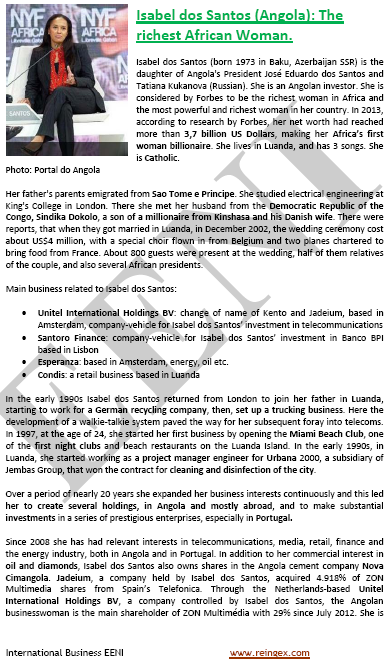
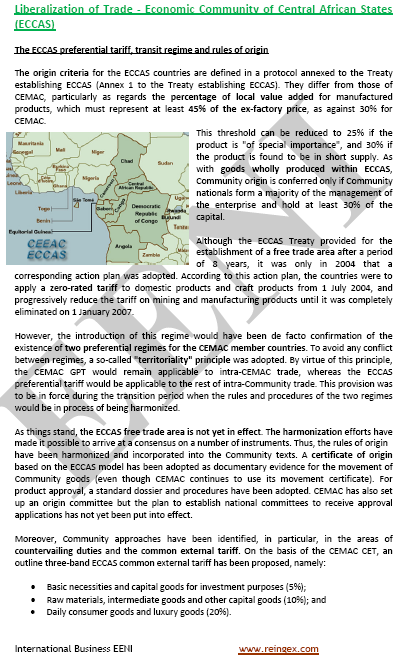
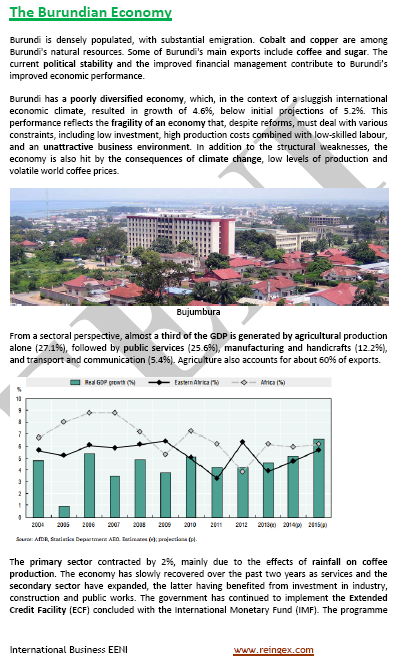
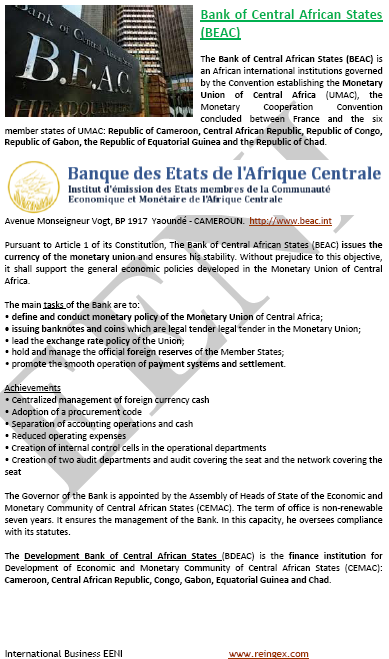
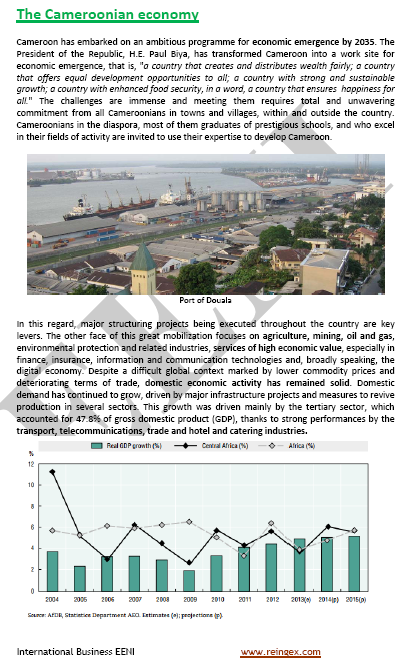
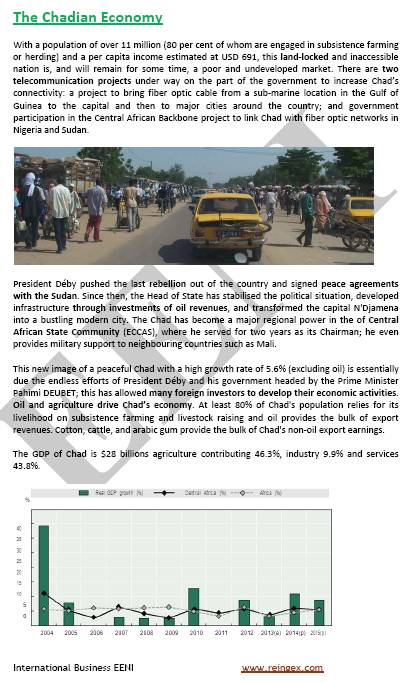
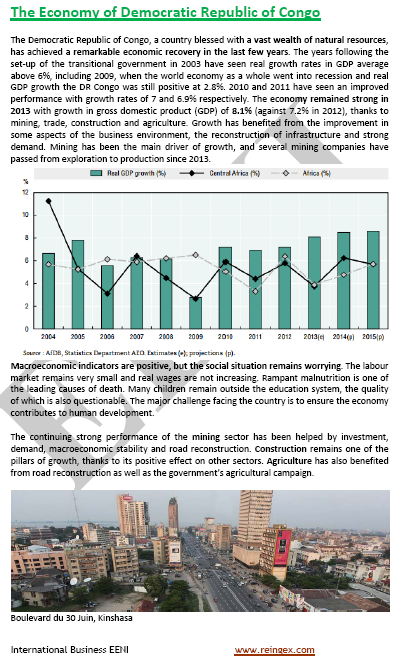
(c) EENI Global Business School (1995-2024)
We do not use cookies
Top of this page




